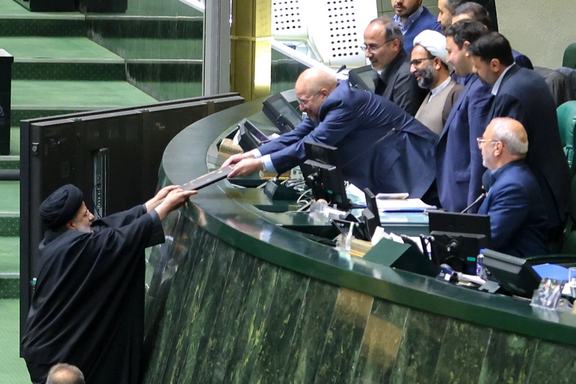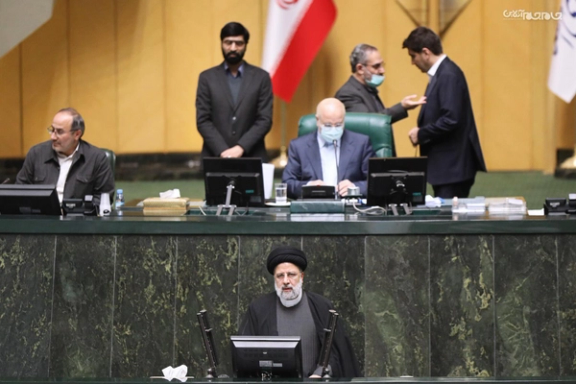Raisi Submits Budget With More For Propaganda, Repression

After weeks of delay, Iran's government has finally submitted the details of its budget bill to parliament for the next calendar year starting on March 21.

After weeks of delay, Iran's government has finally submitted the details of its budget bill to parliament for the next calendar year starting on March 21.
The substantially enlarged draft state budget, which is heavily dependent on tax revenues, will kickstart a month-long review of the bill before parliament holds a vote to approve it and turn it into a law. The total budget, including state enterprises, would be worth some 52,616 trillion rials, or nearly $130 billion (free market rate $1=400,000 rials), indicating an increase of nearly 40% in rial terms compared to that of the current fiscal year. The deadline to submit a budget passed on December 6.
The government’s operational budget covering its departments and organizations is set at about 21,640 trillion rials (slightly over $53 billion at the free market rate). Last year’s budget was around $40 billion, with a huge deficit and it is unclear how this larger budget can find revenue sources to become reasonably balanced.
"We aim for economic growth ... creation of more jobs ... and reducing inflation," Raisi told parliament on Wednesday, noting that the administration tried its best so that the budget is "completely compatible" with the "declared policies" of Supreme Leader Ali Khamenei.
According to some reports by media affiliated with the Revolutionary Guard, the draft budget is based on 1.4 million barrels of oil exports per day, despite US sanctions, an increase from the current reported figure of 800 thousand barrels. This would mean $40 billion of oil revenues from March 2023-March 2024. However, the official website of the government, IRNA, emphasized that the exact figure of crude exports is confidential and would not be announced due to the sanctions.
The projected oil exports in the budget is the clearest sign of unrealistic revenue estimates that will not materialize unless Iran resolves its differences with the United States over its nuclear program.
According to lawmaker Malek Shariati-Niasar, the budget could be based on an oil price of $80 a barrel. The figure is also very optimistic because the Islamic Republic is selling its crude well below global prices and is also competing with Russia to give more discounts to the buyers, especially Chinese small refineries.
The government being aware of that its oil revenues estimates are not realistic, it has substantially increased tax collection projections. In July, the Supreme Accounting Office released a report covering the period March 21- May 20 showing that except tax revenues, all other major sources of income grossly underperformed. The government’s revenues from taxes, oil exports, customs duties, etc. totaled 880 trillion rials or about $3.5 billion (average free market exchange rate at the time) in the 60-day period. This was just 37 percent of the projected budget revenues. It is important to note that only 15 percent of the projected oil income was collected.
Meanwhile, the new budget bill has an operational deficit of 4,760 trillion rials – or about $11 billion, which 58% higher than this year.

More Money for Suppression and Propaganda
Amid the ongoing antigovernment protests, the regime has substantially increased the budget of security and propaganda institutions.
The official IRGC budget has grown by 28% to reach about 1,200 trillion rials or about $3 billion in today’s exchange rates. But the secretive organization’s real budget is much higher, through illicit oil sales, its vast domestic business activities and other sources. Estimates in the past mentioned figures close to $17 billion annually.
The budget of the traditional army has also increased by 36% to 490 trillion rials (over $1.22 billion), and the budget of the police forces will be up 44% to reach 620 trillion rials (about $1.55 billion).
Moreover, the budget of the Intelligence Ministry increased by 52% to 200 trillion – or about $500 million and the budget of the country’s Prisons Organization increased by 55.5% to over 92 trillion rials – or $230 million. The budget of the state broadcaster (IRIB) has increased by 49% to reach 79 trillion rials or nearly $200 million, in addition to its advertising revenues.
The organizations that are tasked with promoting the clerical regime’s propaganda such as the state broadcaster and the seminaries are also set to receive handsome increases. The Islamic Development Organization’s budget will increase by 53% and the budget for seminaries is set to grow by 130%. The Qom Seminary Service Center will receive about 60 trillion rials ($150 million), the Supreme Council of Qom Seminaries will receive about 30 trillion rials ($75 million), and the Ministry of Culture and Islamic Guidance will receive about 54 trillion rials ($135 million). The budget for Headquarters For Enjoining Right And Forbidding Evil, tasked with promoting the clerical regime's interpretation of Islamic laws, will also increase 33%.
These figures well surpass the budget of most provinces in the country, including the education ministry.
On the other hand, the significant increases do not apply to the budget allocated for air pollution reduction plans, which is one of the country's fundamental problems. The budget is only 810 billion rials (about $2 million), which has declined by 10 percent from last year.
Amid galloping inflation and rising joblessness, Raisi claimed that his government is not far behind its promise of creating one million jobs annually, saying that “the unemployment rate has decreased.”
Inflation in the country has soared to over 50%, the highest level in decades. Youth unemployment remains high with over 50% of Iranians being pushed below the poverty line, according to reports by Iran's Statistics Center.